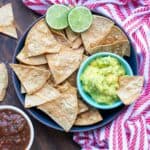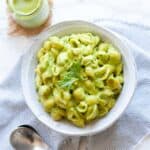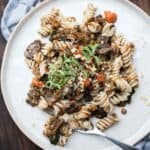Macros are the talk of the town in the diet world. But what are macronutrients actually? Listen to find out why we need them all!

You know how I feel about macros, and why I don't discriminate. But what about the science behind it? Listen in as we hear from a registered nurse and nutritionist all about why they are so important!
Podcast: Play in new window | Download | Embed Subscribe now! Apple Podcasts | iHeartRadio | TuneIn | Deezer | RSS | More
Mama Jenn is a registered nurse, has a dietetics (nutrition) degree and is passionate about empowering others to take ownership of their health. She runs Eating4E, a fun, informative YouTube channel for parents on how to get enough protein, calcium & vitamin D through a plant-based kid & adult diet and so much more in a delicious way. All in 10 minutes or less!
They talk about the 4 E’s: Eating for ETHAN/EVAN, Eating for ENERGY, Eating for ENVIRONMENT and Eating for EMPATHY. They encourage the “5 to stay alive” challenge of eating 5 or more servings of fruits & veggies per day. Join in on the fun & together create a sustainable future!
What are macros?
Macros are a short term for macronutrients. If we break up the word, macro means large and nutrient means nourishments. So basically, macronutrients are nutrients we need in large amounts.
The key to a macronutrient is that it has to provide calories. The three main categories are carbohydrates, protein and fat.
Carbohydrates and protein provide 4 calories per gram and fat has 9 calories per gram.
There are other things our body needs in larger amount, for example fiber however fiber doesn't provide calories so it isn't considered a macronutrient.
Why our body needs macronutrients and what they do
Without macronutrients our body would not function at it's best, and for some instances it wouldn't function at all. Here are the main functions for each of the macronutrients:
Protein
Protein builds and repairs muscle tissue. When we eat protein, we are getting amino acids. There are 20 total amino acids, eleven are made by body and nine of them we get through food.
We used to think that we had to combine foods in one meal to get complete protein in order to get the amino acids, but research now shows that our body is super smart and can grab what it needs from the different foods throughout the day, so that myth was debunked.
Protein is found in many foods, even plants. Some complete proteins are quinoa, edamame, hemp seeds, chia seeds and buckwheat.
While about 96% of our country does not have a protein issue (and instead a fiber issue), if you're concerned about your protein intake, a good rule of thumb (as stated by the physicians committee for responsible medicine) is take your weight in pounds and multiply by .36 (for kids it would be .45).
Fat
Fats insulate the body and helps with vitamin absorption. Vitamins A, D, E, and K are fat soluble so they need fat to absorb them.
The brain is 60% fat and therefore also needs fat. Omega 3-fatty acids are important for learning and memory.
However the types of fat you are eating is important. The best fats are mono and poly unsaturated fats, things like nuts, avocado, seeds, etc. Getting fats from whole foods is the goal.
Saturated fats should be avoided or eaten sparingly. They are directly linked to heart disease and promote build up of plaque. The number one food consumed in our country that is filled with saturated fat is cheese!
Most saturated fats come from meat and dairy, but some, like coconut, come from plants. People with heart disease should still avoid, or really limit, their consumption of coconut as it has the same affect in the arteries.
Lastly, trans fats are the worst of them all and should be avoided as much as possible.
Carbohydrates
Carbs are basically fuel for our brain. Our brain breaks them down into glucose to use for all they do. The brain is essentially a muscle and our muscles need a lot of carbs for energy.
The brain does so much, it runs our body and needs a lot of energy to keep us running at full speed.
When we limit carbs too much we get side effects like brain fog and headaches because that is our brains way of saying they aren't getting what they need to function.
Many food have carbs. The best carbs come from whole foods, much like the other macronutrients. Things like whole grains, potatoes, and fruit all are great sources.
Macronutrients and weight loss
There are so many fad diets out there that sell omitting one of the macros in order to reach a specific weight goal. These fad diets come and go, some reemerge under a different name/fat in the future.
But one thing is for certain, our body needing all the macros to function has never changed.
Many of these fad diets promote low carb and high fat and/or high protein. While you may lose weight initially using this method, looking at what you actually eliminated may give you a better answer.
Was it foods high in sugar and or those lacking nutrients? Perhaps instead of eliminating macros we can use a good, better best model and replace with better choices in each category. The best way to lose weight long term is eating nutrient dense foods and adding movement into your routine.
Also, for weight loss, lowering your fat instead of eliminating a whole macro will lead to more success because fat provides 9 calories per gram while the other macros provide 4. However we need some fat to function so eliminating fat altogether is not a good idea.
In fact, some recent research by Dr. Greger shows that when choosing whole food fats when trying to lose weight, eating whole nuts instead of nut butter is a better choice.
Reason being is since you are chewing to break down the nut you don't actually absorb all the calories in the nuts. But since nut butter is already broken down, you do consume all the calories. Very interesting to say the least!
Also, when trying to lose weight you want to feel full and satiated and nutrient dense foods with fiber and protein fill you up.
Why macros are important
Not only do we need each macronutrient for their main functions, but when we remove one or the other from our diet we can also cause a domino effect in other areas that depend on our main functions.
For example, when you eat carbs, especially those filled with whole grains, you are also getting fiber too. Fiber helps our immune system and breaks down into short chain fatty acids.
If we remove carbs we are in turn reducing our fiber intake and therefore affecting other systems.
Don't forget to join Jenn on her Eating4E YouTube channel for more awesome info and great recipes!
she says a green a bean and a grain

PS- If you liked this episode of Real Food Real Conversations, please subscribe and leave me a review!
And tag me on Instagram whenever you're listening! I reply to all my messages!














Questions or comments? Let me know below!